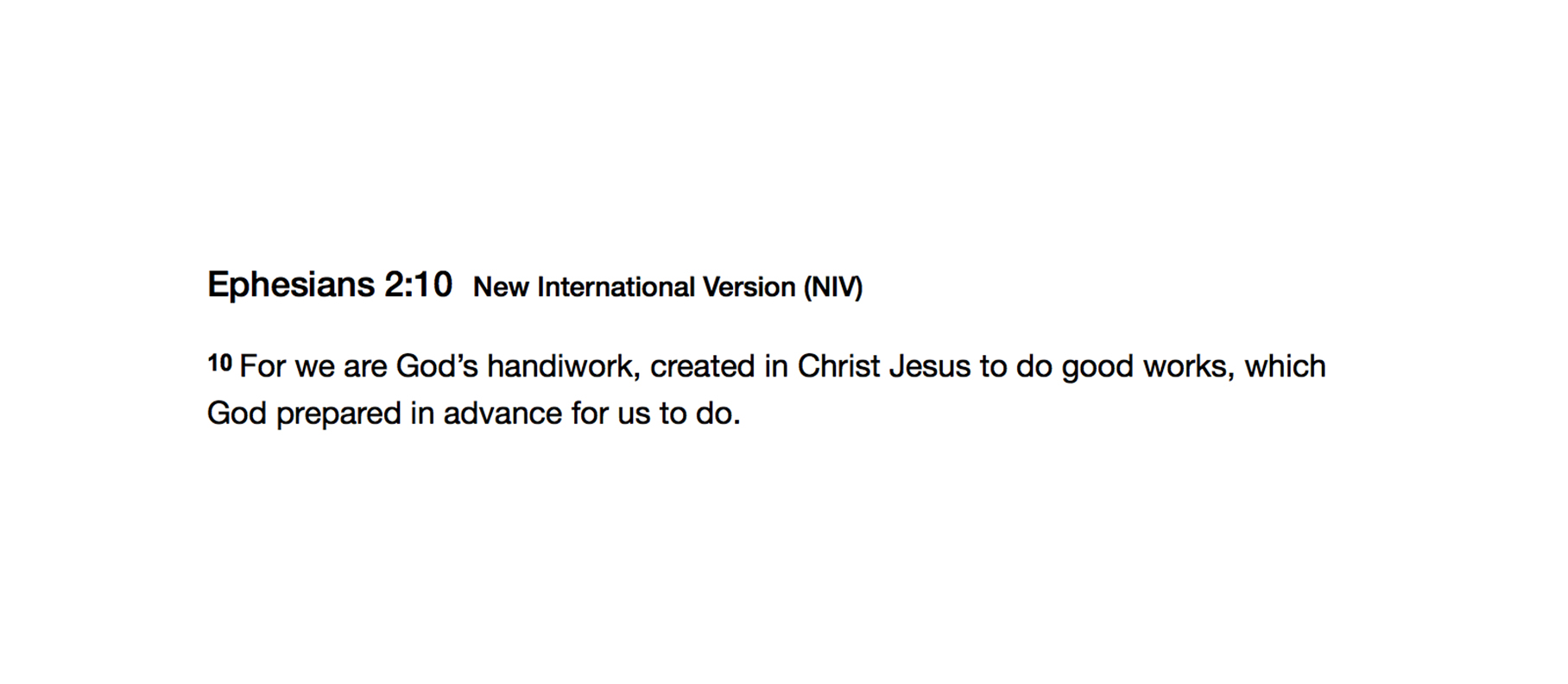Ephesians 2:10: God’s Workmanship and Our Works
To be good is the first thing, to do good is the second. Make the tree good and its fruit good. –MacLaren’s Expositions
The church today is filled with many dormant seeds - alive but not actively growing.
Sleeping.
Yet I believe the job of the church is to be a fertile soil in which us seeds can be planted, cultivated, and incubated.
Each of us must then grow up to bare fruit outside of the confines of our soil, to do good in the wider world.

God’s Workmanship
10 For we are God’s handiwork, created in Christ Jesus… –Ephesians 2:10
Our first step into Christianity is the decision to be re-created by Christ in us.
We must first accept Him, compelled by His grace, before we can begin working for Him, compelled by our faith.
And let us all remember the order in which being and doing come. We must be good first, and then, and only then, shall we do good. We must have Christ for us first, our sacrifice and our means of receiving that new life, and then, Christ in us, the soul of our souls, the Life of our lives, the source of all our goodness. –MacLaren’s Expositions
Our Faith Works
Works do not justify, but the justified man works.
The single greatest decision we can make for ourself - to believe in and receive God’s gift of Salvation - is a separate matter from leading the life we are called to live for God, His Kingdom, His will, and His world.
We are not gifted grace, salvation, and redemption for the sake of a lifelong spiritual party or celebration for those of us who are now “saved”. For when we receive His sacrificial gift, we are now, in fact, “called”.

‘Created in Christ Jesus unto good works.’ That is what life is given to you for. That is why you are saved, says Paul. Instead of working upwards from works to salvation, take your stand at the received salvation, and understand what it is for, and work downwards from it.
There are far too many of us who half-consciously do still hold by the notion that if a man believes rightly then that makes him a Christian.
You are saved that you may be good, and do good continually; and unless you are so doing you may be steeped to the eyebrows in the correctest of creeds, and it will only drown you.
For a biblical context, read Are We Justified by Faith (Romans) or by Works (James)? by the Christian Apologetics & Research Ministry (CARM):
James is examining two kinds of faith: one that leads to godly works and one that does not. One is true, and the other is false. One is dead, the other alive; hence, “Faith without works is dead.” (James 2:20).
This is why in the middle of his section on faith and works, he says in verse 19, “You believe that God is one. You do well; the demons also believe, and shudder.” James says this because the demons believe in God; that is, they have faith, but the faith they have is useless. It does not result in appropriate works. Their faith is only a mental acknowledgment of God’s existence [ascentia vs. fiducia or very simply, head-knowledge vs heart-knowledge].

Notes
The following is a collection of important excerpts I gathered from select commentaries for my future reference:
MacLaren’s Expositions
The belief that a man may work towards salvation is a universal heresy. And the Apostle, in the context, summons all his force to destroy that error, and to substitute the great truth that we have to begin with an act of God’s, and only after that can think about our acts. To work up towards salvation is, in the strict sense of the words, preposterous; it is inverting the order of things. It is beginning at the wrong end. It is saying X Y Z before you have learnt to say A B C. We are to work downwards from salvation because we have it, not that we may get it. And whatever ‘good works’ may mean, they are the consequences, not the causes, of ‘salvation,’ whatever that may mean.
The low popular notion that salvation means mainly and primarily immunity from the ultimate, most lasting future consequences of transgression, a change of place or of condition, infects us all, and is far too dominant in our popular notions of Christianity and of salvation. And it is because people have such an unworthy, narrow, selfish idea of what ‘salvation’ is that they fall into the bog of misconception as to how it is to be attained. The ordinary man’s way of looking at the whole matter is summed up in a sentence which I heard not long since about a recently deceased friend of the speaker’s, and the like of which you have no doubt often heard and perhaps said, ‘He is sure to be saved because he has lived so straight.’ And at the foundation of that confident epitaph lay a tragical, profound misapprehension of what salvation was.
For it is something done in you; it is not something that you get, but it is something that you become. The teaching of this letter, and of the whole New Testament, is that the profoundest and most precious of all the gifts which come to us in Jesus Christ, and which in their totality are summed up in the one word that has so little power over us, because we understand it so little, and know it so well-’salvation’-is a change in a man’s nature so deep, radical, vital, as that it may fairly be paralleled with a resurrection from the dead.
To be good is the first thing, to do good is the second. Make the tree good and its fruit good.
‘Created in Christ Jesus unto good works.’ That is what life is given to you for. That is why you are saved, says Paul. Instead of working upwards from works to salvation, take your stand at the received salvation, and understand what it is for, and work downwards from it.
[S]o salvation in its essence means, not the deliverance from any external evil or the alteration of anything in the external position, but the revolution and the re-creation of the man’s nature. And the purpose of it is that the saved man may live in conformity with the will of God, and that on his character there may be embroidered all the fair things which God desires to see on His child’s vesture.
There are far too many of us who half-consciously do still hold by the notion that if a man believes rightly then that makes him a Christian.
You are saved that you may be good, and do good continually; and unless you are so doing you may be steeped to the eyebrows in the correctest of creeds, and it will only drown you.
Contrast this conception of the purpose of Christianity with the far too common notion that we are saved, mainly in order that we may indulge in devout emotions, and in the outgoing of affection and confidence to Jesus Christ. Emotional Christianity is necessary, but Christianity, which is mainly or exclusively emotional, lives next door to hypocrisy, and there is a door of communication between them. For there is nothing more certain and more often illustrated in experience than that there is a strange underground connection between a Christianity which is mainly fervid and a very shady life. One sees it over and over again. And the cure of that is to apprehend the great truth of my text, that we are saved, not in order that we may know aright, nor in order that we may feel aright, but in order that we may be good and do ‘good works.’ In the order of things, right thought touches the springs of right feeling, and right feeling sets going the wheels of right action. Do not let the steam all go roaring out of the waste-pipe in however sacred and blessed emotions. See that it is guided so as to drive the spindles and the shuttles and make the web.
What He bids us do He fits us for; what He fits us for He thereby bids us do.
And let us all remember the order in which being and doing come. We must be good first, and then, and only then, shall we do good. We must have Christ for us first, our sacrifice and our means of receiving that new life, and then, Christ in us, the soul of our souls, the Life of our lives, the source of all our goodness
Expositor’s Greek Testament
His final object was to make good works the very element of our life, the domain in which our action should move.
Benson Commentary
He hath purified the fountain, that the streams may be pure; hath made the tree good, that the fruit may be good; hath made us new creatures, that we may live new lives; one grand and important end certainly of our regeneration. So that we must still ascribe the whole glory of all the good that is in us, or is done by us, to God.
Pulpit Commentary
Little inward capacity had we for such works, that we required to be created in Christ Jesus in order that we might do them. The inward new birth of the soul is indicated. When good works were required, this gracious change had to be wrought to secure them. The purpose of the new creation is to produce them.
[Good works] are the subjects of a Divine decree. Before the foundation of the world it was ordained that whoever should be saved by grace should walk in good works. The term “walk,” here denotes the habitual tenor of the life; it is to be spent in an atmosphere of good works. Here we have one of the Divine safeguards against the abuse of the doctrine of salvation by grace. When men hear of salvation irrespective of works, they are apt to fancy that works are of little use, and do not need to be carefully attended to. On the contrary, they are part of the Divine decree, and if we are not living a life of good works, we have no reason to believe that we have been saved by grace.
Jamieson-Fausset-Brown Bible Commentary
Works do not justify, but the justified man works (Ga 5:22-25).
Galatians 5:25
Since we live by the Spirit, let us keep in step with the Spirit.


Leave a Comment